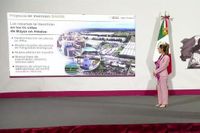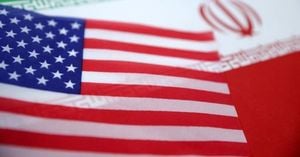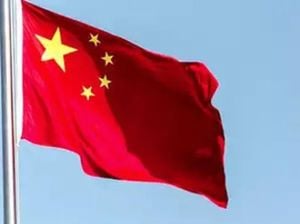In a year marked by economic uncertainty and tense international relations, Mexico has managed to secure a significant win for its economy and public health sector, all while deftly navigating challenges posed by its northern neighbor. On August 9, 2025, the Ministry of Economy and Ministry of Health jointly announced a landmark 12.2 billion peso investment in the country’s pharmaceutical industry by four major global companies—Boehringer Ingelheim, Carnot Laboratories, Bayer, and AstraZeneca. This announcement, part of the government’s ambitious Plan Mexico, underscores President Claudia Sheinbaum’s commitment to positioning Mexico as a leader in pharmaceutical innovation and production.
The details of the investment are impressive. Boehringer Ingelheim is set to commit 3.5 billion pesos over several years to transform its Xochimilco plant into the largest of its kind in the world, with a production capacity of 5,000 pharmaceutical tablets for both the domestic market and export to over 40 countries. Carnot Laboratories, matching that figure, will build a new facility in Villa de Tezontepec, Hidalgo, generating 600 highly specialized direct jobs and 5,000 indirect jobs. Bayer’s 3 billion peso investment, to be rolled out over five years, will expand its production of active pharmaceutical ingredients in Orizaba, Veracruz, add new production lines in Lerma, State of Mexico, and double its biological fungicide output in Tlaxcala—products that are already exported to more than 100 countries. AstraZeneca, for its part, is dedicating 2.25 billion pesos over the next two years to clinical research, expansion of its Global Innovation and Technology Center, and its factory in the State of Mexico, resulting in 600 direct and 2,500 indirect jobs.
President Sheinbaum, the first woman and the first Jewish president in Mexican history, emphasized the significance of this moment. “A very significant investment of 12 billion pesos from the pharmaceutical industry for production and research development in our country, linked to the pharmaceutical industry, is part of Plan Mexico, as we proposed,” she stated during the announcement. Sheinbaum also highlighted the launch of the country’s first Economic Development Pole for Well-being, the Parque Industrial Bajío, in Zinapécuaro, Michoacán. Spanning 346 hectares, this industrial park already has initial investors Citelis and Artifibras, and represents a public-private investment exceeding 1 billion pesos in its initial phase.
According to the Ministry of Economy, the pharmaceutical sector’s investment is not only a boon for job creation—3,120 highly specialized direct jobs and 22,500 indirect jobs are expected—but also a signal that the country’s business climate remains attractive to global players. Economy Minister Marcelo Ebrard Casaubon described the investment as “significant,” particularly because of its impact on public health and the broader economy. Health Secretary David Kershenobich Stalnikowitz added that the sector is in a period of transformation, with innovation, expanded clinical research, and digitized processes at the forefront.
The pharmaceutical industry’s confidence in Mexico is further reflected by the words of industry leaders. Bayer Mexico CEO Manuel Bravo Pereyra pointed to the country’s talent pool, the advantages provided by the United States-Mexico-Canada Agreement (USMCA), and the legal certainty present in Mexico as key factors driving their decision. Juan Augusto Muench Castañeda, General Director of Boehringer Ingelheim for Mexico, Central America, and the Caribbean, explained that their investment would make the Xochimilco plant a global leader, supplying both local and international markets. Edmundo Jiménez Luna, General Director of Carnot, noted their new plant in Hidalgo would be a major source of jobs, while AstraZeneca Mexico’s CEO, Julio Ordaz, underscored the company’s commitment to research and innovation through its expanded operations.
This influx of investment comes at a time when Mexico is facing significant external pressures, particularly from the United States. According to Moody’s Analytics, as of August 9, 2025, the effective U.S. tariff rate on Mexican goods stands at 13.5%—a notable increase from earlier in the year, though still relatively low compared to rates imposed on other countries. The Trump administration has maintained a tough stance on trade, accusing Mexico of everything from unfair commercial practices to inadequate action against drug cartels. The U.S. has even enacted a 1% tax on all cash remittances leaving the country, a move that disproportionately impacts Mexican families who rely on funds sent from relatives working abroad. Meanwhile, the CIA has reportedly conducted covert drone operations over Mexico to monitor cartel activity, and U.S. Homeland Security Secretary Kristi Noem has publicly accused President Sheinbaum of “encouraging violent protests” in the U.S., even airing provocative anti-migration ads on Mexican television.
Despite these challenges, Sheinbaum’s administration has managed the U.S.-Mexico relationship with what many observers describe as remarkable professionalism and composure. Sheinbaum herself has maintained nearly monthly phone calls with President Trump. Economy Minister Marcelo Ebrard has been a frequent visitor to Washington, meeting with U.S. trade officials every few weeks since Trump’s election. Rather than responding with confrontation, Sheinbaum’s team has consistently countered criticism with facts and data in daily press briefings, emphasizing steps taken to address U.S. concerns—such as deploying 10,000 troops to the border, extraditing 29 cartel leaders to the United States, and dismantling over 1,000 drug labs.
Sheinbaum’s diplomatic approach appears to have paid dividends. While the U.S. has slapped higher tariffs on countries like Canada and Brazil, Mexico has largely avoided the worst of Washington’s trade wrath. Many analysts believe this is due to Sheinbaum’s ability to “appease [Trump] and give his administration what they want, while steering clear and not responding directly to their frequent insults and attacks,” as Travis Bembenek, CEO of Mexico News Daily, observed. Public support for Sheinbaum remains robust, with her approval rating reaching an impressive 80% in early August 2025.
Looking ahead, Sheinbaum has signaled that the government will continue to encourage international investment in the pharmaceutical sector. In May, she announced a decree to be published in the Official Gazette of the Federation to further incentivize global pharmaceutical companies to produce medicines and medical supplies in Mexico, aiming to cement the country’s status as an industry leader.
As Mexico forges ahead with these development plans, the country finds itself at a crossroads—balancing the demands of international diplomacy, the needs of its citizens, and the promise of economic transformation. For now, the momentum is on Sheinbaum’s side, as her administration’s deft handling of foreign policy and economic strategy continues to draw both investment and international respect.




